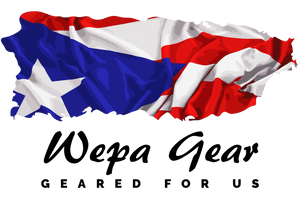DID YOU KNOW?
The African imprint in Puerto Rican culture is apparent in many ways:
Puerto Rican cuisine has a strong African influence. The melange of flavors that make up the typical Puerto Rican cuisine counts with the African touch. Pasteles, for example, were devised by African women on the Isla and based upon food products that originated in Africa. The salmorejo, a local land crab creation, resembles Southern cooking in the United States with its spicing. Mofongo, gandules, cocos, bacalao, yames, plátanos, and funche, are just some of our cuisine that embraces its African roots, weaving them into its Taino and Spanish influences.
 Also in our musica such as bomba and plena. Bomba and plena are often mentioned together as though they were a single musical style, both reflect the African Heritage of Puerto Rico, but there are basic distinctions between them in rhythm, instrumentation and lyrics. Plena developed from Bomba music around the beginning of the 20th century in southern Puerto Rico. Plena lyrics are narrative. They convey a story about events, address topical themes, often comment on political protest movements, and offer satirical commentaries. Tito Matos, leader of the Puerto Rican group Viento De Agua, describes plena as "the newspaper of the people". Plena has only one basic rhythm, in contrast to Bomba's sixteen rhythms. Bomba y Plena evolved into countless styles based on the kind of dance intended to be used. These included leró, yubá, cunyá, babú and belén. The slaves celebrated baptisms weddings, and births with the "bailes de bomba".
Also in our musica such as bomba and plena. Bomba and plena are often mentioned together as though they were a single musical style, both reflect the African Heritage of Puerto Rico, but there are basic distinctions between them in rhythm, instrumentation and lyrics. Plena developed from Bomba music around the beginning of the 20th century in southern Puerto Rico. Plena lyrics are narrative. They convey a story about events, address topical themes, often comment on political protest movements, and offer satirical commentaries. Tito Matos, leader of the Puerto Rican group Viento De Agua, describes plena as "the newspaper of the people". Plena has only one basic rhythm, in contrast to Bomba's sixteen rhythms. Bomba y Plena evolved into countless styles based on the kind of dance intended to be used. These included leró, yubá, cunyá, babú and belén. The slaves celebrated baptisms weddings, and births with the "bailes de bomba".
 Another part of the undisputed African legacy on the Puerto Rican culture includes a peculiar speech pattern. As well as in our vocabulary with words like "borundanga", and "fufú". The West Africans brought to the island spoke Bozal Spanish, a mixture of Portuguese, Spanish, and Congo. It was an attempt by African slaves to speak Spanish. Bozal is considered a pidgin, which did not fully develop into creole as say Haitian Creole or Jamaican Patois. Bozal is possibly extinct, but was spoken in the Caribbean and South and Central America from the 17th Century up until its possible extinction at around 1850. Many Puerto Ricans have the habit of swallowing the "s", and often pronounce the "r" as an "I". This is because in the African tongue there is no "s" or "r" sound.
Another part of the undisputed African legacy on the Puerto Rican culture includes a peculiar speech pattern. As well as in our vocabulary with words like "borundanga", and "fufú". The West Africans brought to the island spoke Bozal Spanish, a mixture of Portuguese, Spanish, and Congo. It was an attempt by African slaves to speak Spanish. Bozal is considered a pidgin, which did not fully develop into creole as say Haitian Creole or Jamaican Patois. Bozal is possibly extinct, but was spoken in the Caribbean and South and Central America from the 17th Century up until its possible extinction at around 1850. Many Puerto Ricans have the habit of swallowing the "s", and often pronounce the "r" as an "I". This is because in the African tongue there is no "s" or "r" sound.
 According to various DNA studies, majority of the African ancestry among black and mixed-raced Puerto Ricans comes from a few tribes such as the Wolof, Mandinka, Dahomey, Yoruba, Igbo, and Congolese, correlating to the modern-day countries of Senegal, Mali, Benin, Nigeria and Angola. Slaves came from all parts of the western coast of Africa, from Senegal to Angola. The most distinct African cultural influence comes from the Yoruba and Congolese tribes in Africa. The Yoruba are a people, not a place. They are a tribe of people who lived in various sections of Nigeria, but predominately west of the Niger River. This part of West Africa, where the native culture is dominated by Yoruba traditions is called "Yorubaland."
According to various DNA studies, majority of the African ancestry among black and mixed-raced Puerto Ricans comes from a few tribes such as the Wolof, Mandinka, Dahomey, Yoruba, Igbo, and Congolese, correlating to the modern-day countries of Senegal, Mali, Benin, Nigeria and Angola. Slaves came from all parts of the western coast of Africa, from Senegal to Angola. The most distinct African cultural influence comes from the Yoruba and Congolese tribes in Africa. The Yoruba are a people, not a place. They are a tribe of people who lived in various sections of Nigeria, but predominately west of the Niger River. This part of West Africa, where the native culture is dominated by Yoruba traditions is called "Yorubaland."
So as you can see, our music and dance, culture, and cuisine are all finely seasoned with sabor Africano!
WEEPAA MI GENTE!! It's all about *THE MORE YOU KNOW*


